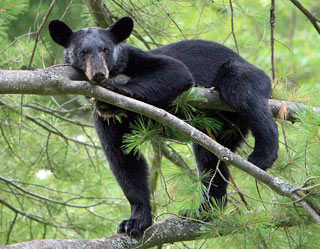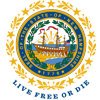Bears: Frequently Asked Questions
Bears: Frequently Asked Questions

What should I do if I find myself around a mother bear with cubs?
Mother bears are rarely aggressive toward humans, but they are protective of their cubs. A mother bear will usually give many warning signs (huffing or popping sounds, swatting the ground or even bluff charges) to let you know that you are too close. Move away as described in FAQ: "What should I do if I encounter a bear?"
Is it legal to feed bears?
People should not feed bears or accommodate their feeding through improper food or garbage storage. Experience in New Hampshire indicates that doing so can enhance the likelihood of property damage, bear/human conflicts, or possibly result in bear behavior that leads to their removal. Purposeful or inadvertant feeding that creates the likelihood of human injury or property damage can result in your being issued a fine, if the attractant is not removed following a request to do so from a Conservation Officer.
When and how can I safely feed birds when bears are around?
Finish your bird feeding activities by April 1 each year. Don't begin feeding the birds again prior to December 1 or the onset of prolonged winter weather (the birds will do just fine). Bears are clever. This, coupled with their strength and agility, make it very difficult to establish bear-proof bird feeders. Purposeful feeding can result in bears getting accustomed to humans. This "habituation" of bears may cause a variety of conflicts with humans. The end result may be the removal (most often with lethal consequences) of the offending bear. Encourage your bird-feeding friends and neighbors to adhere to these guidelines. Be reminded that many people have an irrational fear of bears. A black bear's presence in a residential area may create fear among neighbors and lead to negative consequences for the bear. Regardless of the dates specified above, if a bear is active in your community, you should cease and desist all bird feeding activity. Bears that have access to winter feeders will sometimes remain active, visiting the feeder late into December, and periodically, beyond.
How do I prevent bears from bothering my campsite?
Always keep a clean camp. Don't leave any food, including condiments, out when not in use. Hang food at least 10 feet high (and at least 4 feet from top and side supports), or store it in bear-resistant units, hard-shelled vehicles or car trunks. Never eat in your tent. Keep your sleeping area, tent and sleeping bag free of food and odors. Never bury or burn food waste. In backcountry areas, your sleeping area should be 100 yards from food storage and cooking areas. If a bear comes into your camp, yell, bang pots and pans, and try to scare it away. Bears chase off easier before they obtain food.
A bear took down my bird feeders or has been seen in my yard.
Remove bird feeders immediately. Bird feeders should be taken down by April 1 of each year -- and they should not be put up again until December 1 or later.
Are black bears dangerous?
Yes. Black bears are capable of killing people, but it is an extremely rare occurrence. The last time someone was killed by a black bear in New Hampshire was 1784. Black bears, like all wild animals, should be treated as unpredictable animals. Campground or "panhandler" bears may nip or cuff people that tease with food or crowd around them. In the woods, black bears usually retreat before people are aware of them; normal trail noise should alert bears to your presence.
What should I do if I encounter a bear?
If you see a bear, keep your distance. Make it aware of your presence by clapping, talking, singing or making other sounds. If you get too close to a bear, it may slap the ground, huff, blow and chomp its teeth or rush you (this is referred to as "bluff charge") in an attempt to get you to move a more comfortable distance away. If this occurs, maintain eye contact with the bear, speak in a soft, calm voice and slowly back away from the bear. These actions will help appease the bear and show that you are not weak, but, at the same time, not a threat to the bear. Do not run, avert your eyes or turn your back to the bear. The bear may perceive weakness and enforce dominance. The bear's bluff charge and chomping of teeth are a defense mechanism to establish the bear's dominance in an encounter with humans or a more dominant animal in the wild. Bears can outrun, out-swim and out-climb you. If you are attacked by a black bear, you should fight back rather than "play dead."
When do bears den? When will they come out in the spring?
For northern black bears, denning is an adaptation for escaping winter food scarcity and severe winter weather. Bears are not true hibernators, as they may be easily aroused from this state if disturbed. While bears are in winter dens, body temperature drops 7-8 degrees C, metabolism is reduced approximately 50%, heart rate decreases from 40-50 beats/minute to 8-19 beats/minute, and body weight decreases approximately 25%. Dens may be burrows, caves, hollow trees, wind-thrown trees, slash piles or leaf nests on the ground. Annual food abundance; the amount of stored body fat; the sex and age of the animal; and weather conditions influence the timing and duration of denning. In New Hampshire, bears typically enter dens between mid-October and late November and emerge from dens during late March or early April. During periods of winter thaws, male bears may occasionally get up and move around until cold weather returns.
What kind of bears live in New Hampshire?
The black bear is the only bear species in New Hampshire. Population estimates range between 4,800 to 5,000 bears statewide. Regional bear densities across the state range between 0.1-1.0 bears/square mile and average 0.5 bears/square mile.
When are bear cubs born?
Cubs are born in winter dens during January after a gestation period of about 8 months. Newborn cubs are born hairless, with eyes closed, measuring 6-8 inches in length, and weigh less than 1 pound. Cubs stay with their mother for approximately 18 months and den with her again during the following winter. When they are a year and a half old, cubs leave their mothers prior to the June/July mating season.



